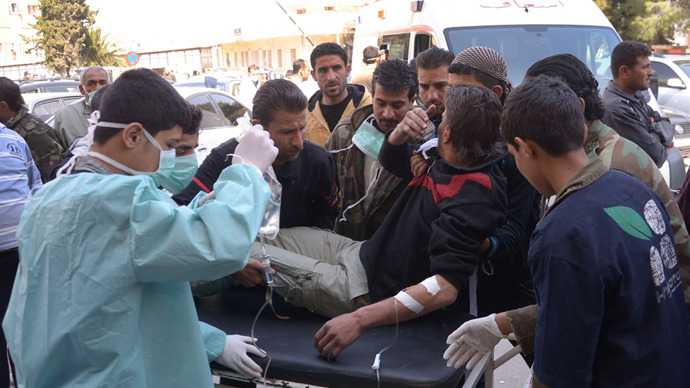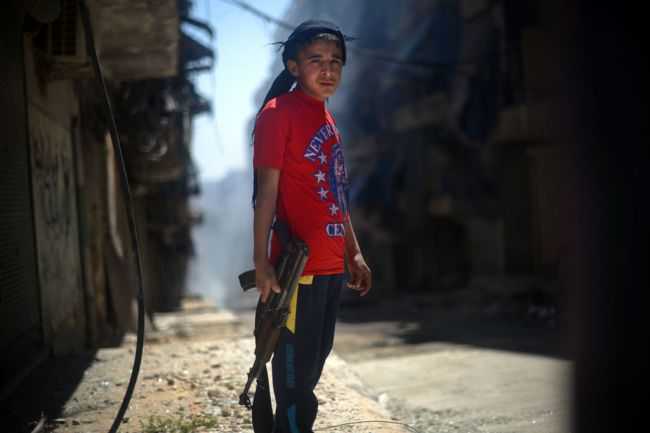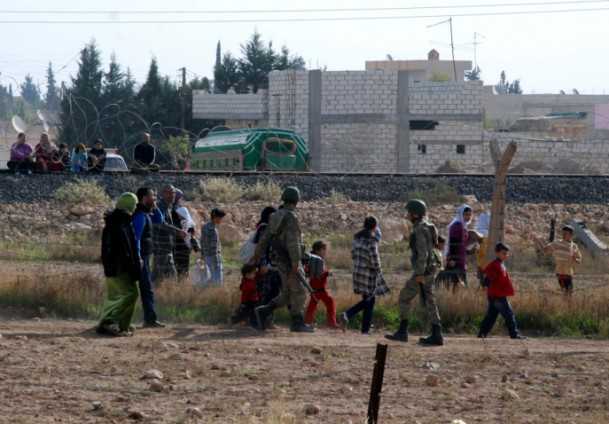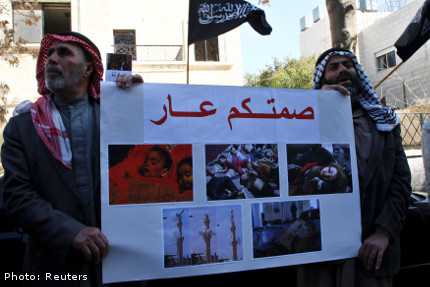Syria’s chemical weapons compound is heavily guarded, with the state fully aware of the consequences of a security lapse, German journalist Manuel Ochsenreiter told RT, noting the opposition could have acquired the weapons through Turkey.

In this image made available by the Syrian News Agency (SANA) on March 19, 2013, a man is brought to a hospital in the Khan al-Assal region in the northern Aleppo province, as Syria’s government accused rebel forces of using chemical weapons for the first time (AFP Photo / Sana)
The Western-backed theory that chemical weapons were taken from the Syrian government’s military compound is very doubtful, according to Ochsenreiter, because “the military compound where gas is stored is heavily guarded. The Syrian government knows exactly what might happen if this gas comes out.”
He said that the weapons might have been from Turkey as it is one of the “most important players in the conflict, which supports the so-called armed opposition” and “Turkey already used chemical weapons in battles against the Kurdish population and militia.”
There have been false statements before, for example the blame of the Syrian government for the June 2012 Houla massacre, which was later refuted “but it didn’t have any affect or result in diplomatic means” noted the German journalist.
Peace activist and journalist Ryan Dawson told RT that it would be difficult to determine where the weapons originated from as the so-called opposition has many outside sources financing it and aiding with weapons.
“We have the Gulf monarchs and Israel. Probably not directly from the US and Israel, because they like to have plausible deniability – they probably went through Qatar or Turkey.”
RT: There’s been widespread opinion, promoted by some major world powers that any chemical weapons use in Syria would only ever be down to the Assad regime. So are you surprised to hear it may have been the rebels using them?
Ryan Dawson: I’m not surprised, because we’ve heard that before, back in December there was a scare about chemical weapons and red lines being crossed. That turned out to be the terrorist mercenaries in Syria. And there was an Israeli airstrike following that in January. So this is the exact same scenario.
RT: If it turns out to be true, where would the rebels have got them from?
RD: It will be difficult to pen down because the so-called opposition has so many outside sources financing them and aiding with weapons. We have the Gulf monarchs and Israel. Probably not directly from the US and Israel, because they like to have plausible deniability – they probably went through Qatar or Turkey.
RT: This investigation is separate from the one launched by the UN’s own chief – so why are there two different probes being carried out by the same body?
RD: The first party to call for the UN investigation was the Syrian government themselves, that’s how confident they were that the mercenaries used the chemical weapons. When you look at it, the US and Israel don’t have a leg to stand on to be lecturing anybody about having or using chemical weapons
RT: Syria was hit this weekend by a series of Israeli airstrikes – do you have any ideas why the attacks took place? Was it really self-defense?
RD: Of course not. But its hard to explain Israel’s actions. You are not talking about a rational player. It’s not the first time Israel has struck inside of Syria. Israel from time to time invades Gaza, attacks Syria, they are trying to bolster their image in the Middle East and get the fear factor and deterrent for themselves. Yet again Israel will claim that Syria was shipping weapons to Hezbollah, which they consider a terrorist group. Though the Israelis are aiding the mercenaries in Syria, which have killed up to 70, 000 people. So concerning the chemical weapons killing a dozen or so people – that is just a red line, they are just looking for a pretext. The wanted to strike anyway.
RT: There are so many blank spaces in the story, mostly because Israel’s avoiding all questions about the strikes – Why is that? Do you think international bodies will move in to shatter this silent strategy?
RD: Israel is fishing for escalation; the mercenaries are starting to lose. You’ll see the Western powers backing the mercenary groups just enough to keep the perpetual conflict going. But there are no decisive battles. That’s the whole point, the profit from it, to destroy Syria from within.
RT: Could Israel face justice here?
RD: They ought to, but they won’t. Israel has absolute immunity from international bodies, because the US and Canada back them up no matter what they do. We are talking about a state that has open apartheid, open ethnic cleansing, they are colonizing Palestine, they shoot children at will – they are breaking UN resolutions and nothing ever happens. Israel felt confident that they could go on a clumsy pretext of chemical weapons and bomb whatever they want and get away with it.
via ‘Chemical weapons for Syrian opposition may have come from Turkey’ — RT Op-Edge.





